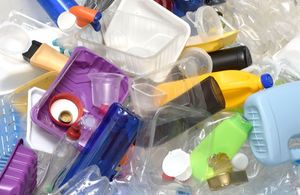Businesses urged to get ready for reforms to cut packaging waste
Reporting requirements for the Extended Producer Responsibility scheme for packaging come into force today.

Plans to make it easier for consumers to recycle packaging waste move a step closer today, as reporting requirements for Extended Producer Responsibility (EPR) come into force.
Extended Producer Responsibility for Packaging (pEPR) will make firms that supply household packaging responsible for the costs of dealing with packaging waste, moving costs away councils and council taxpayers.
Producers will be required to pay for the collection and disposal costs of household packaging they supply when it becomes waste. This will encourage producers to reduce the amount of packaging they place on the market, and to improve the recyclability of their packaging – in turn ensuring less waste ends up in the natural environment.
From today, all obligated packaging producers in England, Northern Ireland and Scotland must collect information on the amount and type of packaging they have supplied during 2023. Wales will follow shortly.
Producers with a turnover of greater than £2 million and who handle more than 50 tonnes of packaging each year must also report this information to the Environment Agency twice a year.
The first reports must be submitted from 1 October 2023.
Environment Minister Rebecca Pow said:
We need to stem the flow of packaging which goes unrecycled and instead is lost forever to landfill and incineration.
As set out in our Environmental Improvement Plan, these reforms will encourage businesses to increase their use of recyclable materials, shifting costs away from the taxpayer and supporting our work to protect the environment from the scourge of waste.
Deep Sagar, chair of the Advisory Committee on Packaging, said:
Packaging materials that are not recycled back into new packaging harm our natural environment. Councils have to spend more managing that waste and the public cannot enjoy spaces such as parks and high streets as they should.
Extended Producer Responsibility will reduce that waste. It will make goods producers pay for collection of all packaging waste encouraging them to reduce or recycle more packaging. I look forward to supporting government and industry in making this smart policy work for the public and improving the environment.
Claire Shrewsbury, Director of Insights and Innovation at the Waste and Resources Action Programme, said:
The introduction of an EPR for packaging could be a game-changer. If done effectively, it could reduce the impact packaging has on the environment by regulating material use and increasing recycling.
For EPR to work it must serve all – producers, local and central government, recyclers, and the public. We’ve been working with these key groups since 2018 to help collaboration on pEPR.
In 2020, 12 million tonnes of packaging was placed on the UK market, some of which contains plastics that are hard to recycle. Incentivising producers to use better, more recyclable materials will help to stem this tide of waste.
Producers will be required to pay an EPR fee towards the costs of collecting and managing household packaging waste, currently borne by local authorities. This shift of cost is estimated to be around £1.2 billion per year across all local authorities, once EPR is fully operational.
Before decisions are made about the final shape of the scheme, we need to gather information from businesses that will be affected. This data will provide the basis for establishing the packaging waste management fees individual producers will pay in 2024, when pEPR comes into force.
We are engaging with businesses and local authorities to shape the future vision of waste reforms through industry-wide sprint events, deep dive sessions and fortnightly forums. This will help ensure business readiness for our planned reforms from 2024, ensuring industry are involved in shaping the long-term future of EPR.
These plans build on our wider efforts to eliminate avoidable plastic waste. Earlier this year we announced that a ban on single-use plastic plates, trays, bowls, cutlery, balloon sticks, expanded and extruded polystyrene food and drinks containers, including cups, will be introduced in England from October 2023.
We have also announced further details on the implementation of our Deposit Return Scheme for drinks containers to boost recycling and clamp down on plastic pollution and litter.
We have already introduced a ban on microbeads in rinse-off personal care products, restrictions on the supply of single-use plastic straws, drink stirrers and cotton buds, and our world-leading Plastic Packaging Tax introduced last year.
Meanwhile, our single-use plastic carrier bag charge has successfully cut sales by over 97% in the main supermarkets.
For further information, please see our specific guidance on collecting data for packaging EPR, along with our wider guidance for industry on GOV.UK.